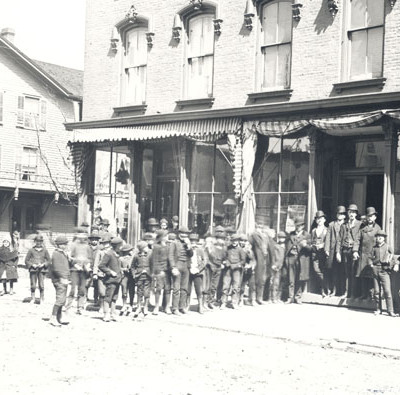
Titusville was founded in 1796 and incorporated as a borough in 1849. It was a small center of lumber activity until 1859, when Col. Edwin Drake discovered oil in the area. Between 1860 and 1870, the population increased nearly 1,900 percent. The large influx of people prompted the borough to incorporate as a city in 1866.
The oil boom across the region attracted a small number of Jews to parts of Crawford and Venango counties. Approximately 27 mostly German Jews from Pittsburgh organized the Jewish Reformed Society on August 2, 1863 to arrange for the purchase of a cemetery on Cherrytree Hill, according to the 1899 historical volume Our County and Its People.
The group adopted the name Titusville Hebrew Congregation at a meeting on November 15, 1863 and officially incorporated with the state as B’nai Zion Congregation on December 19, 1869. B’nai Zion Congregation worshiped at a series of rented halls until June 28, 1872, when it dedicated a synagogue on Franklin Street. The congregation had 24 members at the time of a cornerstone laying ceremony in 1871. By 1885, it had declined to only 13 members, according to a volume from that year called The History of Crawford County, Pennsylvania. The congregation was still active by 1899, although it appears to have closed soon thereafter. The synagogue remained vacant for years until being converted into a church. As of 2017, the building housed a graphic design studio.
B’nai Zion Congregation employed at least five rabbis during its first twenty-five years—Rabbi Felix Jesselsohn, Rabbi Joseph Swed, Rev. Dr. Benjamin Eger, Rev. Alexander Rosenspitz and Rev. M. Faber, who had the longest tenure, from 1887 until at least 1897.
During the early years of the oil boom, a group of Lithuanian Jews also settled in Titusville. Many came from New York State, and most did not become engaged in the oil industry. Among them was a butcher, a store clerk, a cigar maker, a liquor dealer, two hucksters, six clothiers and merchants and twenty-six peddlers, according to a review of the 1870 census by historian Jacob Feldman in The Jewish Experience in Western Pennsylvania, A History: 1755-1945. The large number of peddlers, according to Feldman, suggests an active trade in the boomtowns scattered throughout the region.
Approximately 20 people from this group of Lithuanian Jews organized B’nai Gemiluth Chesed as an Orthodox congregation in 1863, established a cemetery in 1868 and obtained a charter in 1870. B’nai Gemiluth Chesed built a synagogue at Mission and Water Streets in 1870 but sold the building to a railroad company in 1872 and built a new synagogue and parsonage on Martin Street the following year. B’nai Gemilas Chesed quickly became the larger of the two congregations, with 43 members by 1885.
The Jewish community of Titusville established B’nai B’rith Lodge No. 81 in 1866, although the lodge appears to have been dissolved at some later point because several residents of Titusville joined a new lodge established in nearby Oil City, Pa. in 1920.
With the economic swings common to boom town, the Jewish population of Titusville fluctuated greatly through the late 19th and early 20th century, as oil production came and went and other industries took over. The 1880 volume Statistics of the Jews of the United States listed a Jewish population of 500 for Titusville, along with 22 members of B’nai Zion and 26 children in its school. The American Jewish Yearbook listed a population of 205 in its 1918-1919 edition, up to 400 in its 1928-1929 edition, down to 1975 in its 1940-1941 edition and down again to 120 in its 1951 edition. B’nai Gemilas Chesed disbanded around 1970, and the synagogue was demolished after 2009.